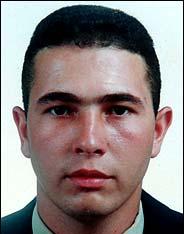See No Evil, Hear No Warning
The first taste surprised me with its fruity overtones. But then, I'm a near beer connoisseur, and take to wine when my only other choices are Miller and Corona.
"What do you think?" asked John, after I'd savored a few palate-fuls.
"It's good." And later, unsolicited, I told my wife I really enjoyed this wine. It was growing on me.
When my glass emptied, John raised the bottle. "Would you like some of this?" he asked.
"No, that's okay. You guys take it, I've already had some."
"No, you haven't," John said, pouring me a taste. And they began to laugh.
While I was gone, they had asked the bartender to pour the worst wine he had, a Shiraz that had been open for a few days, while they quaffed the Bourdeaux. The maturity and subtlety of this new wine was immediately apparent. The bottle on the table, the good company and the expertise of my wine-loving friends had induced me to savor the swill in my glass.
I laughed until I was mopping my cheeks.
***********
I was speaking with a Swiss friend about a potential art project intended to bring us closer to the consequences of violence done in our name. We don't need to experience the violence directly, I said, but leaving it too much in the abstract is also dangerous. She said she believed the American character was essentially good and meant to do the right thing, but that a belief in one's own essential goodness creates blinders. We become unable to see when our actions cause harm, because we mean no harm.
In addition to her teaching, she prints limited fine editions of English poetry and has an excellent command of the language. Though she has lived in America for decades, she still has a marked Swiss accent. She said, "Sometimes English is just background noise to me. It doesn't register at all. It could be because a pronounciation is slightly off, or because my mind is elsewhere and I can't bring myself back. At those times, I don't even hear my own name."
************
But of de Menezes, we expect more. In England for only three years, practicing a trade far less demanding of language skills, and in a moment of tremendous stress, we expect him to be perfectly attuned, and not at all disoriented.
Meanwhile, the others on the periphery can hardly keep the facts straight.
His English was excellent. No, he likely misunderstood the commands.
He wore a padded jacket. No, an overcoat. No, a fleece pullover.
The cops were in plain clothes. No, the place was crawling with uniformed bobbies as well.
He ran because he had been terrorized by hooligans two weeks earlier. No, says another report. He was playing a game of chase with his friend. No, he'd called his co-worker on the alarm job to say he was running late. No, he must've run because police were yelling for everyone to run or get down.
"As I turned out the door onto the platform, I heard four dull bangs." No, "they pushed him to the floor, bundled on top of him and unloaded five shots into him." No, eight. Seven in the head.
He had an expired student visa. No, his work visa was in order.
************
John and Jim are slugging it out in the comments section below. Meanwhile, I am trying to improve my grip on the subject, and trying to avoid a selective view of the facts.
Incidents filled with ambiguities, misunderstandings and slip-ups accumulate until an innocent man and conscientious police careen toward tragedy. Now we try the case with our blinders on.
Before you insist you know what happened, you can't start with the moment de Menezes panicked. You have to go upstream.
Police had his building — a "small block of flats" — under surveillance, because suspects in the earlier bombings lived there. Hours later they raided an apartment and arrested one man. Didn't police have a list of all the tenants in the building they were preparing to raid?
Since he was presumably already dark-skinned, wearing a jacket and trailing wires when he left a suspected bomber hangout, why was de Menezes allowed to walk the five minutes from his flat to catch the No. 2 bus? Did he become more suspicious after traveled through two intermediate stops between Tulse Hill and Stockwell Station? Why didn't police apprehend him before he got on the bus, since two other buses had already been attacked?
A news story says there were two police units involved. One, the surveillance team at the flats, and the other, an armed team that confronted him at the station. If so, what communication, if any, transpired between the police watching the house and the police guarding the station?
If three police pursued de Menezes into the station, why were they all behind him? How does a suspect exiting a bus elude awaiting armed officers? (John claims the station was crawling with police, including uniforms.) Did the arrival of the No. 2 bus catch them by surprise?
At least one eyewitness talks about de Menezes being pursued into the train by plainclothes cops. But did he immediately know they were police, or did he put it together after the scene was cleaned up, with the microphones and cameras pointed at him. (This is the same witness who counted five shots. But, hey, I've had a few problems as a witness myself.)








